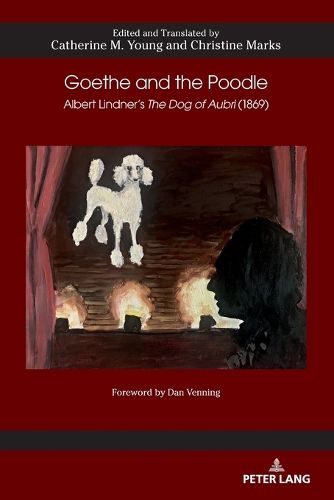Readings Newsletter
Become a Readings Member to make your shopping experience even easier.
Sign in or sign up for free!
You’re not far away from qualifying for FREE standard shipping within Australia
You’ve qualified for FREE standard shipping within Australia
The cart is loading…






This title is printed to order. This book may have been self-published. If so, we cannot guarantee the quality of the content. In the main most books will have gone through the editing process however some may not. We therefore suggest that you be aware of this before ordering this book. If in doubt check either the author or publisher’s details as we are unable to accept any returns unless they are faulty. Please contact us if you have any questions.
"This superbly compiled and provocative edition makes available for the first time in English translation Albert Lindner's metatheatrical play on the canine conflict that disrupted Goethe's Weimar Classicism with melodramatic sensation to herald modernism. The critical apparatus offers a rich historiographical frame for reading diegetic animals in performance, while images of primary documents help vivify the context. Thus framed and honed with two staged readings, the German- and English-language play texts raise intriguing questions about des Pudels Kern, the absent/present poodle's core meaning. Faustian allusions evoke disturbing dynamics of white patriarchy amid complex intersections of political and theatrical autocracies that resound to the present day."
"In Goethe and the Poodle, you get not only an extraordinary play but, also, extraordinary history. Young and Marks make Lindner's nineteenth-century play accessible, bringing out its humor and its theatricality. In the introduction and footnotes, they use the play to teach the reader about the sweep of nineteenth-century German theater, from Goethe and French melodrama through to unified Germany. The book is eminently teachable, in German as well as English, and very entertaining."
Goethe and the Poodle is the first English translation of scholar Albert Lindner's 1869 play Der Hund des Aubri, which premiered at Berlin's Wallner Theater during the German Wars of Unification. Inspired by actual events, Lindner's eccentric play stages the conspiracy to bring a popular melodrama featuring a trained poodle to the Weimar Court theater in 1817, Johann Wolfgang von Goethe's resistance to the performance, and his subsequent departure after leading the theater for 26 years. Thorough annotations explain the play's cultural and geographic references, and the introductory essay analyzes aesthetic debates surrounding Weimar Classicism, popular taste, and animal performance. Archival images including playbills, portraits, and the 1812 Weimar Theater Laws supplement the volume's contributions to theater history.
$9.00 standard shipping within Australia
FREE standard shipping within Australia for orders over $100.00
Express & International shipping calculated at checkout
This title is printed to order. This book may have been self-published. If so, we cannot guarantee the quality of the content. In the main most books will have gone through the editing process however some may not. We therefore suggest that you be aware of this before ordering this book. If in doubt check either the author or publisher’s details as we are unable to accept any returns unless they are faulty. Please contact us if you have any questions.
"This superbly compiled and provocative edition makes available for the first time in English translation Albert Lindner's metatheatrical play on the canine conflict that disrupted Goethe's Weimar Classicism with melodramatic sensation to herald modernism. The critical apparatus offers a rich historiographical frame for reading diegetic animals in performance, while images of primary documents help vivify the context. Thus framed and honed with two staged readings, the German- and English-language play texts raise intriguing questions about des Pudels Kern, the absent/present poodle's core meaning. Faustian allusions evoke disturbing dynamics of white patriarchy amid complex intersections of political and theatrical autocracies that resound to the present day."
"In Goethe and the Poodle, you get not only an extraordinary play but, also, extraordinary history. Young and Marks make Lindner's nineteenth-century play accessible, bringing out its humor and its theatricality. In the introduction and footnotes, they use the play to teach the reader about the sweep of nineteenth-century German theater, from Goethe and French melodrama through to unified Germany. The book is eminently teachable, in German as well as English, and very entertaining."
Goethe and the Poodle is the first English translation of scholar Albert Lindner's 1869 play Der Hund des Aubri, which premiered at Berlin's Wallner Theater during the German Wars of Unification. Inspired by actual events, Lindner's eccentric play stages the conspiracy to bring a popular melodrama featuring a trained poodle to the Weimar Court theater in 1817, Johann Wolfgang von Goethe's resistance to the performance, and his subsequent departure after leading the theater for 26 years. Thorough annotations explain the play's cultural and geographic references, and the introductory essay analyzes aesthetic debates surrounding Weimar Classicism, popular taste, and animal performance. Archival images including playbills, portraits, and the 1812 Weimar Theater Laws supplement the volume's contributions to theater history.